Marcus Choi is about to return to East West Players for Prince Gomolvilas’ stage adaptation of Scott Heim’s Mysterious Skin, directed by Tim Dang. EWP audiences will remember Marcus from his dynamic performance as the Leading Player in Stephen Schwartz’s Pippin. Prior to that, he made his Broadway debut in the 2002 revival of Rodgers & Hammerstein’s Flower Drum Song, and was then an original cast member of the megahit Wicked. Marcus has also appeared on Broadway in Twyla Tharp’s The Times They Are A Changin’ and Sweet Charity. In regional theater, he’s played Sky Masterson in Guys and Dolls, Glen in Rumors, and Adam in Diary of Adam and Eve, among others. His film and TV appearances include Walt Disney’s Enchanted, the independent films Fetish and The Lure, Nickelodeon’s iCarly, In Gayle We Trust, an upcoming episode of Undercovers, and numerous commercials. Marcus recently took time from his busy Mysterious Skin rehearsal schedule to chat with StageSceneLA.
Hi Marcus. I’d imagine it’s been an exciting journey for you … from growing up in L.A. to performing in Disneyland parades to entertaining on cruise ships to debuting on Broadway … and now back to your hometown for Mysterious Skin. So tell me, when did you first get interested in show business? Did you grow up singing and dancing?
I played sports going up, but as soon as I started performing I realized it was the first thing that I truly excelled at. I break the Asian stereotype that we’re all good students and good at math. Okay, I’m pretty good at Math …
What was your parents’ reaction to their son preferring performing to becoming a math whiz?
My parents were totally against the idea of me pursuing a career in the arts. They supported me and came to my high school shows, but they were loud and clear from day one that they were against it and pushed me into S.A.T. prep classes even harder.
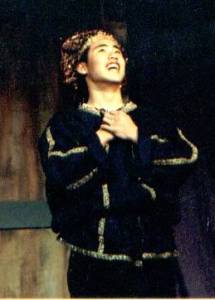
A very young Marcus in Once Upon A Mattress
Fortunately for audiences, your passion for the arts prevailed in the end. So, how old were you when you made your professional debut?
My first professional production was The Hunchback of Notre Dame at the Disneyland resort in Anaheim. I was 18 and my role was M8.
Excuse me? Were you a robot, like R2D2?
No, M8 means Male Dancer Number 8 in the parade portion of the show.
Aha! So, did it bother you just being a number?
I didn’t care what I was doing, I was just happy to be a part of this show and experience. It was at Disneyland that I met some of my best friends that I still keep in touch with today. I went on to do numerous other shows and parades at Disney and loved the idea that it was always there to come back to when I would leave for other jobs.
So Disneyland played a major role in shaping the Marcus Choi we know today?
I consider Disneyland to be the place that helped me grow as a performer and prepared me for more things to come.
When and how did your move to New York come about?
As a matter of fact, a friend from Disney told me about the audition for Flower Drum Song at the Mark Taper Forum. I thought “Why not?” Only after I got the job did I find out that it was going to Broadway. Broadway! I was so excited because this was what I wanted since the age of 14. So in the summer of 2002, I moved to the Big Apple.
I can only imagine how exciting that must have been, to move to New York at such a young age, and even better, not in search of a job but because you already had one lined up! Speaking of Flower Drum Song, two of your biggest credits to date have been that production and, not long afterward, Stephen Schwartz’s megamusical Wicked. Can you compare the two experiences—reworking a classic Rodgers & Hammerstein show, first in L.A. and then in New York vs. appearing in a show built, so to speak, from the ground up?
These two shows are so special and dear to me for different reasons. By the time Flower Drum Song came to L.A. it was pretty much done with the structure and writing. They had been through numerous workshops in New York and the majority of the cast was a part of that process, so I had some catching up to do. The Mark Taper Forum has a thrust stage and it naturally created an intimacy with the audience, some of which was lost when we went to New York.
I imagine it must have been a disappointment for you when Flower Drum Song closed after just six months.
I think it was March of 2003, the musician’s union in New York went on strike due to contract negotiations and the Equity members went on a sympathy strike. Three weeks later Flower Drum Song closed on Broadway. I had never felt so close and felt so much love for a cast of people.
And then there was Wicked. Did you have any inkling of what you were getting yourself into?
When I received a call for Wicked, I had no idea just how big and monstrous this show was going to become.
Can you talk a bit about that experience, and working with such a tremendous cast?
The original cast was some of the most talented people that I have ever had the pleasure of working with. I felt like I was in a real live “Shiz University”. Everyone was a unique personality, talent, color, shape and just as special as the next.
I’d guess there was a lot of work that went into creating such a complex production.
The rehearsal process for Wicked was long and tedious. It’s such a technical and automation-heavy show, the majority of our rehearsals were spent working these things out. They had previously workshopped the songs and scenes, and Wayne Cilento, the choreographer, works fast. So once the show was up on its feet, there was a lot of “tweaking” or fine-tuning. Unlike Flower Drum Song, the changes that the creative team made in Wicked between the pre-Broadway run in San Francisco and the move New York were for the better. The transitions were cleaner and the story was clearer and I knew we had a hit.
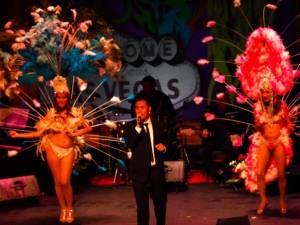
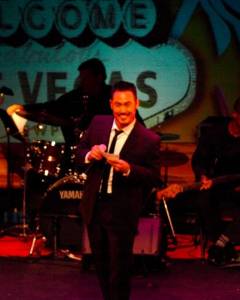
Marcus in Vegas mode at an East West Player’s benefit (Photos: LIly Lim)
You’ve danced in quite a few films and TV programs, from Walt Disney’s Enchanted to Late Night With David Letterman. How would you define yourself—as a dancer who acts, an actor who dances, or as something else entirely?
I consider myself an actor who dances and sings. If I can, I approach everything from an acting point of view. Sometimes it just doesn’t apply, however my main concern is to tell the story. Dancing and singing are tools to help.
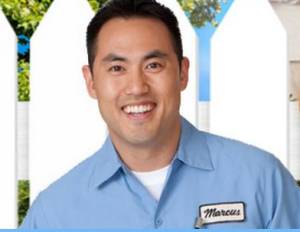
Marcus as Emergency Road Guy in In Gayle We Trust
These days you’ve been building your film and TV résumé, including independent features and the web series In Gayle We Trust. How does this work compare with the experience of performing in live theater?
Film/TV and theater are so vastly different. I feel like film and TV are like the 100-meter dash. Fast, flashy and close competition. I recently had the pleasure of shooting an episode of J.J. Abrams’ new NBC show Undercovers. I auditioned on a Friday, received a phone call on Monday and shot the episode on Tuesday. The hardest part was to remember to take a moment to enjoy the experience. I would tell myself, “Look around and take it all in, because this is what you came back to L.A. for!”
So has film and TV work taken the place of theater in your heart?
My first love is theater, but it’s like running a marathon. There are so many stages of the creative process and it truly takes dedication, time and effort. But I’m passionate about it and that’s why I’m so thankful for East West Players and being able to continue what I love to do. At the same time, I’d like to do more TV and film in the future because I think it will only help my theater career, like Liev Schreiber, Michael C Hall and B.D. Wong, who’ve created a successful career in both fields. My intention isn’t to put myself on their level, but only to believe that it’s possible to achieve.
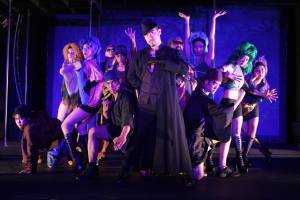
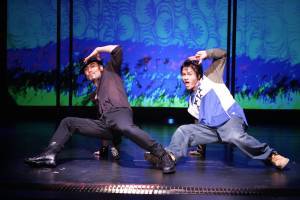
Marcus (with Ethan Le Phong) in Pippin (Photos: Michael Lamont)
L.A. audiences probably remember you most for your stellar performance as the Leading Player in Pippin at East West Players. What was it like for you to reinvent this role in an Asian-cast revival, particularly in one which had such a different style and rhythm to it than the Broadway original?
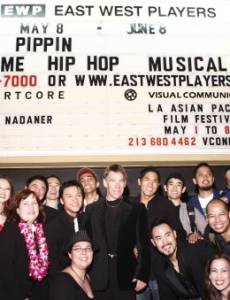
Marcus, Stephen Schwartz, and the cast of Pippin on Opening Night
It was an exciting process, because I love Hip Hop, I love musical theater, and because I’d never done anything like it. The blueprint was there and Tim Dang really gave me the freedom to explore and play with the part. The Broadway original was groundbreaking and I understand that I could never be Ben Vereen from 1972, and I know better than to ever try. But Pippin is a show within a show, and it gives the freedom for anyone to tell this story. So I ran with it and had a blast.
Now you’re about to return to the East West Players stage in an adaptation of Scott Heim’s Mysterious Skin, a very different project for you to say the least. Can you tell us something about your role in the play?
Different is an understatement. I play five different characters in the play and no matter how big or small the scene is, they’re all difficult in their own way. I think the most difficult challenge is to re-create myself for each character and being able to decompress when I get home after rehearsals.
Having read the novel, and seen both Gregg Araki’s film version and Prince Gomolvilas’ stage adaptation of Mysterious Skin, I’d guess that East West audiences are in for something considerably edgier and more adult than the usual fare. Care to comment?
I would say that this show is definitely suited for a more mature audience. Everyone in the show is so very talented and I know everyone who comes to see the show will be moved in some way.
Mysterious Skin, though adapted for the stage by an Asian American playwright, is not a play that would normally offer roles to Asian American actors, if only for its very Midwest setting. How important is it to the Asian American acting community to have a theater like East West Players in Los Angeles, and how has this company affected your career (and the roles you’ve gotten to play) in particular?
It’s very important to have East West Players as a vehicle to showcase Asian American talent that might not have the opportunity elsewhere. Although it’s 2010, colorblind casting isn’t always a popular choice. East West Players has become a family to me and although this is only my second theatrical production with them, they’ve created opportunities for me to grow as an actor and further my career.
If you could design the ideal career future for yourself over the next five years, what would that be?
I’m still learning the ins and outs of Hollywood, and so if I could realistically design my ideal career future over the next five years, it would be this. I would continue to do co-star, guest-star and reoccurring roles so I would continue to learn the business and meet as many people as I can. Then I would write and co-produce a TV show where I’m able to utilize all of my talents. I would love to act in films that are poignant and that I am truly interested in, and then parlay this momentum into doing roles on Broadway.
Sounds like a plan to me! And in the meantime, there’s Mysterious Skin, a show I’m really looking forward to seeing on Opening Night, especially after having had the chance to get to know one of its stars a good deal better!
Thanks Steven, make sure you get yourself a Tim Danger Banger on opening night. Just ask the bartender.
I’ve already sent in my order!
Click here for more information about Mysterious Skin and to order tickets.
September 9 to October 10
MYSTERIOUS SKIN
East West Players, David Henry Hwang Theatre, 120 Judge John Aiso St., Los Angeles. Through October 10. Wednesdays through Saturdays at 8:00. Sundays at 2:00. Reservations: 213 625-7000

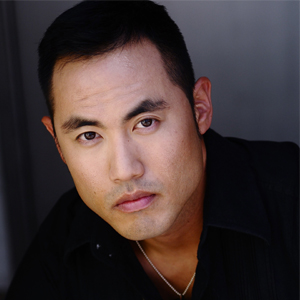

 Since 2007, Steven Stanley's StageSceneLA.com has spotlighted the best in Southern California theater via reviews, interviews, and its annual StageSceneLA Scenies.
Since 2007, Steven Stanley's StageSceneLA.com has spotlighted the best in Southern California theater via reviews, interviews, and its annual StageSceneLA Scenies.







 COPYRIGHT 2025 STEVEN STANLEY :: DESIGN BY
COPYRIGHT 2025 STEVEN STANLEY :: DESIGN BY